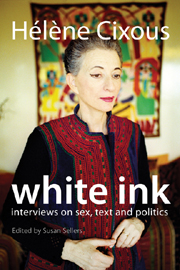Book contents
- Frontmatter
- Contents
- Acknowledgements
- Editor's note
- Preface: On being interviewed
- Part I Writing the enigma
- Part II Writing the feminine
- Part III Writing and politics
- Part IV Writing and theatre
- Part V Writing roots
- 10 Language is the only refuge
- 11 Being a Jewish woman is the ideal place
- Part VI On painting, music and nature
- Part VII Dialogues
- Envoi: But the Earth still turns, and not as badly as all that
- Bibliography of Hélène Cixous's works
- Index
11 - Being a Jewish woman is the ideal place
from Part V - Writing roots
- Frontmatter
- Contents
- Acknowledgements
- Editor's note
- Preface: On being interviewed
- Part I Writing the enigma
- Part II Writing the feminine
- Part III Writing and politics
- Part IV Writing and theatre
- Part V Writing roots
- 10 Language is the only refuge
- 11 Being a Jewish woman is the ideal place
- Part VI On painting, music and nature
- Part VII Dialogues
- Envoi: But the Earth still turns, and not as badly as all that
- Bibliography of Hélène Cixous's works
- Index
Summary
This interview appeared as “Être femme juive, situation idéale”, in Les Nouveaux Cahiers 46 (Autumn), 92–5, 1976.
js Did you have a Jewish consciousness linked to history, to anti-Semitism?
cixous In biographical, personal terms, one of the determining features of my childhood and my youth was the fact of being in a melting pot in which the question of anti-Semitism was always there, in an atmosphere that was truly poisoned by it: no matter how far I go back in my childhood, it was there. Becoming conscious of this and hearing myself being called Jewish must have happened almost simultaneously. From that perspective, and from my account of what aggression can etch upon the Jewish unconscious, of course I bear its marks.
In my earliest childhood, when I was in Oran, I lived in a wholly Jewish environment for the simple reason that Jews were not allowed to attend educational establishments. So I was, without knowing it, in a sort of private school at which there can't have been any non-Jews, but I didn't know that: I was too little to know that this was a result of an historic situation. But, later, when my family settled in Algiers, which was not their home town, it was in a lycée where I realized once and for all, where there was an unacknowledged, “tacit” numerus clausus, and I spent my secondary education without any other Jews around me, and I missed that a great deal.
- Type
- Chapter
- Information
- White InkInterviews on Sex, Text and Politics, pp. 135 - 142Publisher: Acumen PublishingPrint publication year: 2008



